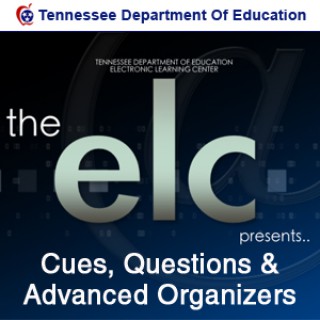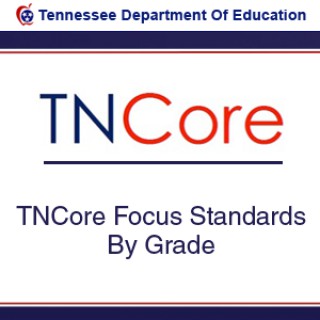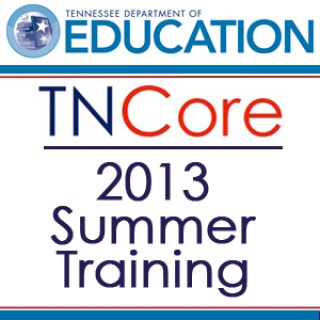
Cues, Questions & Advanced Organizers
Follow Cues, Questions & Advanced OrganizersThis series will feature Tennessee teachers working together to implement effective teaching practice into all Tennessee classrooms. Nine instructional strategies have been identified that are most likely to improve student achievement across all content areas and grade levels. These strategies are…
Tennessee State Department of Education
- Mar 15, 2011 LATEST EPISODE
- infrequent NEW EPISODES
- 11m AVG DURATION
- 13 EPISODES
More podcasts from Tennessee State Department of Education
Latest episodes from Cues, Questions & Advanced Organizers

Handout questions used in classroom lesson

Handout questions use in classroom lesson and referenced in group discussion

Learning Objectives: The learner will complete a graphic organizer to: Demonstrate comprehension and knowledge gained through reading and research: Analyze and reflect upon information gained while performing research: Formulate questions to extend inquiry about a topic: The learner will use the completed graphic organizer as a reference for discussing and sharing information with peers in a small group: The learner will use advanced questions as a guide for focusing on a video interview as a primary resource. Tennessee Standards: SPI 0801.4.5 Discern irrelevant research material from written text. SPI 0801.5.8 Identify instances of bias and stereotyping in print and non-print texts. SPI 0801.6.1 Formulate appropriate questions before, during, and after reading. SPI 0801.6.3 Use text features to locate information and make meaning from text (e.g., headings, key words, captions, footnotes). SPI 0801.7.4 Draw an inference from a non-print medium. Purpose – 8th Grade Language Arts Class – Students should analyze what further information and facts have been gathered as a result of their research and reading. They should formulate questions which invoke further inquiry and seek clarification about a topic. Students will gather further information by watching a video interview and develop and understanding about instances of bias, stereotyping, and scapegoating.

Learning Objectives The learner will: Be introduced to Shakespeare and the sonnet: Be able to recognize the form of the Shakespearean sonnet: Write his/her own sonnet in correct Shakespearean sonnet form Tennessee Standards: 3001.3.1 Write in a variety of modes (e.g., summary, explanation, description, persuasion, informational, literary analysis, creative expression). 3001.8.8 Analyze the narration and point of view in increasingly complex texts in which the narrator and point of view shift, with multiple characters acting as narrators. CLE 3001.8.2 Understand the characteristics of various literary genres (e.g., poetry, novel, biography, short story, essay, drama). 3001.8.11 Recognize and identify the characteristics of lyric poetry, blank verse, free verse, epic, sonnet, dramatic poetry, and ballad. 3001.1.9 Demonstrate understanding of common foreign words and phrases Purpose – Continue with introduction of difficult foreign words. Introduce sonnet.

T Chart used in classroom and referenced in the group discussion

Learning Objectives: The learner will: Observe pictures of major Tennessee political leaders and listen as the teacher presents the opening of the unit. Tennessee Standards: 4.5.spi.2. identify major Tennessee political leaders (i.e., Andrew Jackson, Sam Houston, James Polk, Sequoyia, David Crockett, Nancy Ward). Purpose – 4th Grade unit on major Tennessee leaders Materials: Teacher made bookmark for use during the lessons of the unit.

Learning Objectives The learner will: count the value of a set of coins up to 1.00: use graphic organizers to brainstorm information Tennessee Standards: Checks for understanding-0101.3.1 Brainstorm ideas with teachers & peers, use graphic organizers to gather information: Checks for understanding-0106.1.4- Count the value of a set of coins up to 1.00 Purpose – Counting quarters up to $1.00

Part 5. In this session, Tennessee Teachers model and discuss cues, questions and advanced organizers. Helping students retrieve what they already know about a topic using questions that elicit inferences, cues, or hints about what is to come enhances their learning about new content. Research shows that cues and questions should focus on what is important and should focus on higher-level questions. Marzano states, "Advance organizers are organizational frameworks teachers present to students prior to teaching new content to prepare them for what they are about to learn. Advance organizers take the surprise out of what is to come, help students retrieve what they already know about a topic, and focus them on the new information.

Part 4. In this session, Tennessee Teachers model and discuss cues, questions and advanced organizers. Helping students retrieve what they already know about a topic using questions that elicit inferences, cues, or hints about what is to come enhances their learning about new content. Research shows that cues and questions should focus on what is important and should focus on higher-level questions. Marzano states, "Advance organizers are organizational frameworks teachers present to students prior to teaching new content to prepare them for what they are about to learn. Advance organizers take the surprise out of what is to come, help students retrieve what they already know about a topic, and focus them on the new information.

Part 3. In this session, Tennessee Teachers model and discuss cues, questions and advanced organizers. Helping students retrieve what they already know about a topic using questions that elicit inferences, cues, or hints about what is to come enhances their learning about new content. Research shows that cues and questions should focus on what is important and should focus on higher-level questions. Marzano states, "Advance organizers are organizational frameworks teachers present to students prior to teaching new content to prepare them for what they are about to learn. Advance organizers take the surprise out of what is to come, help students retrieve what they already know about a topic, and focus them on the new information.

Part 2. In this session, Tennessee Teachers model and discuss cues, questions and advanced organizers. Helping students retrieve what they already know about a topic using questions that elicit inferences, cues, or hints about what is to come enhances their learning about new content. Research shows that cues and questions should focus on what is important and should focus on higher-level questions. Marzano states, "Advance organizers are organizational frameworks teachers present to students prior to teaching new content to prepare them for what they are about to learn. Advance organizers take the surprise out of what is to come, help students retrieve what they already know about a topic, and focus them on the new information.

Part 1. In this session, Tennessee Teachers model and discuss cues, questions and advanced organizers. Helping students retrieve what they already know about a topic using questions that elicit inferences, cues, or hints about what is to come enhances their learning about new content. Research shows that cues and questions should focus on what is important and should focus on higher-level questions. Marzano states, "Advance organizers are organizational frameworks teachers present to students prior to teaching new content to prepare them for what they are about to learn. Advance organizers take the surprise out of what is to come, help students retrieve what they already know about a topic, and focus them on the new information.

















